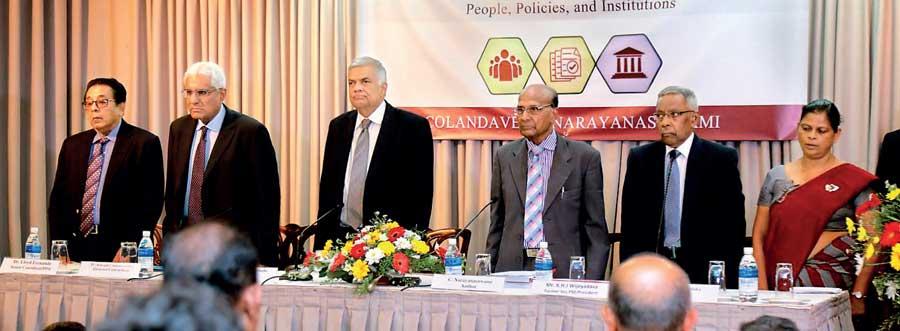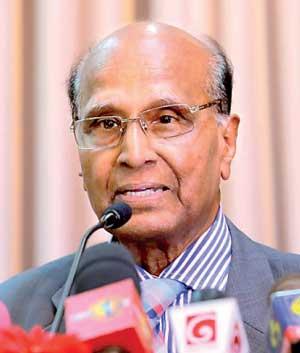Reply To:
Name - Reply Comment

Mr. C. Narayanasuwami, formerly of the Ceylon Civil Service (CCS) and retired senior professional of Asian Development Bank at Manila in the Philippines, launched his book titled ‘Managing Development: People, Policies and Institutions’ on November 2 in Sydney, Australia. This was following its release in Colombo on August 29, 2019.
The launch in Colombo was held at Hector Kobbekaduwa Agrarian Research and Training Institute (HARTI), the first director of which was the author, was attended by high-level officials attached to government ministries and departments (both current and past), senior officials of statutory bodies and academic institutions including universities and representatives from the media, research and training institutions.

The participation of former Prime Minister Ranil Wickremesinghe as Chief Guest was an honour and privilege in view of his knowledge and interest in subject matters covered in the book. Similarly, the participation of accomplished guest speakers Dr. Indrajit Coomaraswamy, former Central Bank Governor, K.H.J. Wijeyadasa, former civil servant and retired secretary to former President and Prime Minister R. Premadasa and Dr. Lloyd Fernando, senior consultant at the Postgraduate Institute of Management added value to the proceedings.
The speakers referred to the relevance and significance of the findings and analyses presented in the book and congratulated the author for the comprehensive contributions on governance including public sector reforms, institution-building for development, agrarian reforms, rural development, monitoring and evaluation.
The reflection of experiences gained by the author in over twenty countries provided a range of information on the successes, failures and effectiveness of varied development interventions. Sri Lanka was singled out in the discussions on governance and the need for reform was articulated in view of the prevailing systemic failure in public sector performance. The detailed analyses of institution-building issues set forth pervasive and intractable issues that constrained development in many countries in the Asia-Pacific region. The discussion on monitoring and evaluation received specific attention in view of the focus given to defining concepts and analysing how these tools contributed to assessment of development effectiveness – a subject of great contemporary relevance for project/programme review, analysis and results measurement.
The reflection of experiences gained by the author in over twenty countries provided a range of information on the successes, failures and effectiveness of varied development interventions
The speakers concurred with the view that the pace and process of development are generally determined by good policies, sound governance, effective institutions and strengthened capacity to implement and manage projects thereby endorsing and validating the findings of the author.
At the conclusion of the launch, the former premier and co-speakers thanked the author for presenting the findings in a coherent and readable form for the benefit of the larger development community striving to improve development management under difficult conditions. It was suggested that the book should be made available to a wider readership. Consequently, a leading publisher in Colombo, Vijtha Yapa, was entrusted with the sale of the book. Interested readers could purchase copies from this bookshop and also through the publisher in Manila.
The book launch in Sydney was equally successful, generating enthusiastic participation. The participation of eminent economists and civil society leaders as guest speakers elevated the level of interest in subjects covered in the book. Ms. Jody McKay, Member for Strathfield and Leader of the Opposition, Legislative Assembly of the New South Wales Parliament participated as the Chief Guest, followed by the Guest of Honour, Sri Lankan High Commissioner for Australia, J.C. Weliamuna and former Attorney-General of Sri Lanka, Shiva Pasupati.
In addition, two key speakers Dr. Peter McCawley, former member of the Board of Directors of the Asian Development Bank (ADB) in Manila and former Deputy Director-General of the Australian Agency for International development (AusAID) and Ronald Skeates, former Director of Evaluation, Energy and Industry departments of ADB provided valuable insights into the scope and focus of the book and recommended it as a ‘must read’ for postgraduate students and development practitioners in developing countries.
In conclusion, Dr. McCawley said: “Mr. Narayanasuwami – whom most of us know as “Nam” – has produced an excellent book on development in Asia. This book discusses development – the challenges of development are very real in Asia today, and will remain real for at least another 50 years or more. It is very welcome that these issues are discussed in such a careful way. I am very glad to be able to join with you all in launching the book in Australia.”
Two events of significance that enhanced the value of the Sydney book launch were the thoughtful gesture of Ms. Jody McKay to present a certificate of congratulations to the author from the New South Wales Parliament and an acknowledgement motion passed at the Strathfield Municipal Council weekly meeting of November 5 endorsing the author’s contribution to development management in the context of Australian involvement in project development and aid management in developing countries.
The speakers drew attention, as was the case in Colombo, to the relevance of the analysis and findings and requested the participants to spread the message among development practitioners and universities. In this regard, the attention of the author was drawn to popularising the book among leading booksellers and distributors. It is expected that stocks of the book will become available in leading bookshops through accredited distributors.
Overall, both book launches received significant publicity and a high-level of participation and acclaim from participants from all walks of life. They served to highlight the relevance of the findings for improved management of development undertakings in countries in the Asia-Pacific which are still grappling with poor governance, inadequate management capabilities, weak policies, ineffective institutions and unsatisfactory approaches to assessing development effectiveness due to lack of streamlined monitoring and evaluation systems.